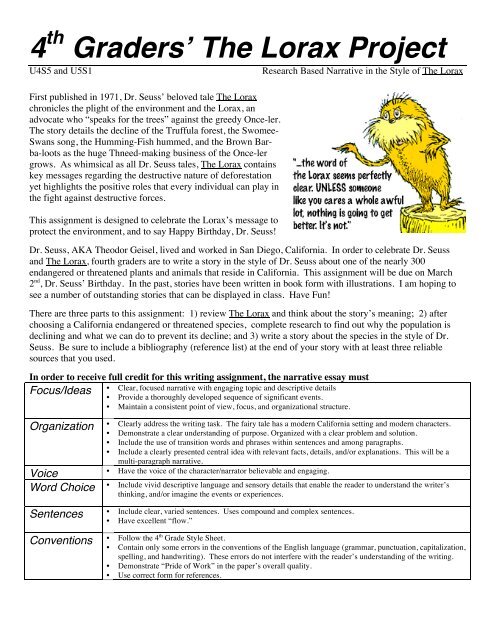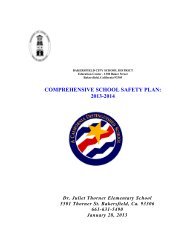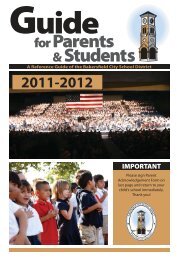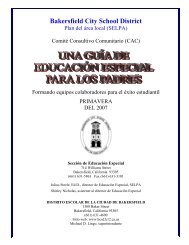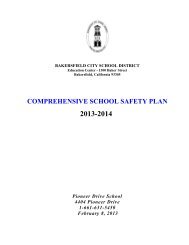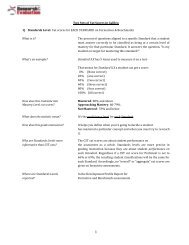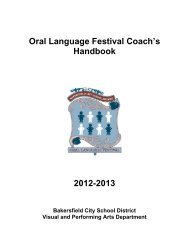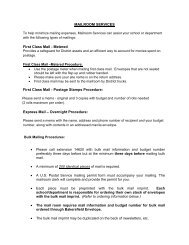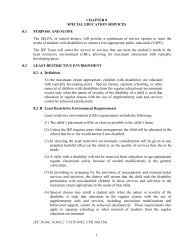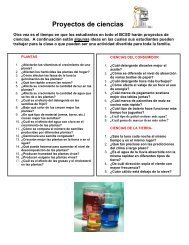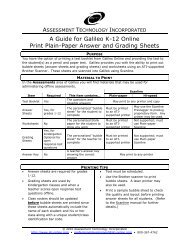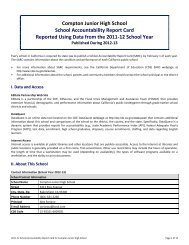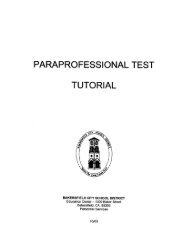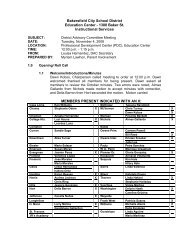24.U4S5 - BCSD Static Server
24.U4S5 - BCSD Static Server
24.U4S5 - BCSD Static Server
Create successful ePaper yourself
Turn your PDF publications into a flip-book with our unique Google optimized e-Paper software.
4 th Gradersʼ The Lorax Project<br />
U4S5 and U5S1<br />
Research Based Narrative in the Style of The Lorax<br />
First published in 1971, Dr. Seuss’ beloved tale The Lorax<br />
chronicles the plight of the environment and the Lorax, an<br />
advocate who “speaks for the trees” against the greedy Once-ler.<br />
The story details the decline of the Truffula forest, the Swomee-<br />
Swans song, the Humming-Fish hummed, and the Brown Barba-loots<br />
as the huge Thneed-making business of the Once-ler<br />
grows. As whimsical as all Dr. Seuss tales, The Lorax contains<br />
key messages regarding the destructive nature of deforestation<br />
yet highlights the positive roles that every individual can play in<br />
the fight against destructive forces.<br />
This assignment is designed to celebrate the Lorax’s message to<br />
protect the environment, and to say Happy Birthday, Dr. Seuss!<br />
Dr. Seuss, AKA Theodor Geisel, lived and worked in San Diego, California. In order to celebrate Dr. Seuss<br />
and The Lorax, fourth graders are to write a story in the style of Dr. Seuss about one of the nearly 300<br />
endangered or threatened plants and animals that reside in California. This assignment will be due on March<br />
2 nd , Dr. Seuss’ Birthday. In the past, stories have been written in book form with illustrations. I am hoping to<br />
see a number of outstanding stories that can be displayed in class. Have Fun!<br />
There are three parts to this assignment: 1) review The Lorax and think about the story’s meaning; 2) after<br />
choosing a California endangered or threatened species, complete research to find out why the population is<br />
declining and what we can do to prevent its decline; and 3) write a story about the species in the style of Dr.<br />
Seuss. Be sure to include a bibliography (reference list) at the end of your story with at least three reliable<br />
sources that you used.<br />
In order to receive full credit for this writing assignment, the narrative essay must<br />
Focus/Ideas<br />
Organization<br />
•<br />
•<br />
•<br />
•<br />
•<br />
•<br />
•<br />
Clear, focused narrative with engaging topic and descriptive details<br />
Provide a thoroughly developed sequence of significant events.<br />
Maintain a consistent point of view, focus, and organizational structure.<br />
Clearly address the writing task. The fairy tale has a modern California setting and modern characters.<br />
Demonstrate a clear understanding of purpose. Organized with a clear problem and solution.<br />
Include the use of transition words and phrases within sentences and among paragraphs.<br />
Include a clearly presented central idea with relevant facts, details, and/or explanations. This will be a<br />
multi-paragraph narrative.<br />
Voice<br />
• Have the voice of the character/narrator believable and engaging.<br />
Word Choice<br />
• Include vivid descriptive language and sensory details that enable the reader to understand the writer’s<br />
thinking, and/or imagine the events or experiences.<br />
Sentences<br />
Conventions<br />
•<br />
•<br />
•<br />
•<br />
•<br />
•<br />
Include clear, varied sentences. Uses compound and complex sentences.<br />
Have excellent “flow.”<br />
Follow the 4 th Grade Style Sheet.<br />
Contain only some errors in the conventions of the English language (grammar, punctuation, capitalization,<br />
spelling, and handwriting). These errors do not interfere with the reader’s understanding of the writing.<br />
Demonstrate “Pride of Work” in the paper’s overall quality.<br />
Use correct form for references.
Name _______________________________<br />
4 th Grade Spelling Parent Initial: Activity Leader:<br />
U4S5 Encyclopedia Brown and the Case of the Slippery Salamander<br />
Prefixes un-, dis-, in-<br />
All of your spelling homework must be completed and turned in on Friday. In order to better remember<br />
how to spell the words (increase visual memory), you will be expected to print your words and sentences<br />
on Friday’s test.<br />
All Spelling homework is required to be completed neatly and with pride on Wide Ruled Notebook paper<br />
- no frayed edges will be accepted. Be sure to follow the correct heading for each page.<br />
• On a separate sheet of paper, PRINT each of your spelling words three times each.<br />
Also, be sure to practice your sentences for Friday’s test (see other side).<br />
1. un-: not 9. un•im•por•tant 17. dis•o•bey 24. an•ti-: against<br />
2. un•fair 10. un•sus•pect•ing 18. dis•res•pect 25. an•ti•so•cial<br />
3. un•like•ly 11. dis: not, opposite of 19. dis•con•tin•ue 26. an•ti•bi•o•tic<br />
4. un•list•ed 12. dis•trust 20. in-: not, opposite of 27. id•i•os (G root): own,<br />
personal, distinct<br />
5. un•a•ware 13. dis•count 21. in•com•plete 28. id•i•om<br />
6. un•o•pened 14. dis•or•der 22. in•di•rect 29. mal-: bad<br />
7. un•cer•tain 15. dis•re•pair 23. in•a•bil•i•ty 30. mal•func•tion<br />
8. un•solved 16. dis•ap•prove 31. ma•lig•nant<br />
• For this assignment, look up the synonyms of at least ten of your spelling words in a Thesaurus. On a<br />
separate sheet of paper, list the words, and then all of the synonyms that you find for each of the<br />
words. You may use a Thesaurus, www.thesaurus.com, or the Thesaurus in a software program such<br />
as Microsoft Word.<br />
#. Entry word: Synonyms:<br />
:<br />
• Complete the Crossword puzzle for this week’s spelling words.<br />
• Thursday: On a separate sheet of paper, take a spelling pre-test for both the words and the dictation<br />
sentences.<br />
• On a separate piece of paper, write your sentences two times each. PRINT the sentences the first time;<br />
use cursive the second time. Be sure to practice the sentences for Friday’s test. They will be dictated<br />
to you, and you will be expected to print your responses.
1. An idiom is a commonly used expression or phrase that means something different than<br />
what it appears to be.<br />
An idiom is a commonly used expression or<br />
phrase that means something different than<br />
what it appears to be.<br />
2. The boy loftily observed that reading the chapter “The Case of the Bank Robber” in the<br />
book Encyclopedia Brown: Boy Detective was a piece of cake.<br />
(Idiom: piece of cake)<br />
The boy loftily observed that reading the<br />
chapter “The Case of the Bank Robber” in the<br />
book Encyclopedia Brown: Boy Detective was a<br />
piece of cake.<br />
3. The brain behind keeping the crooks from getting away with their crimes was ten-yearold<br />
Encyclopedia Brown.<br />
(Idioms: the brain behind, getting away with)<br />
The brain behind keeping the crooks from<br />
getting away with their crimes was ten-yearold<br />
Encyclopedia Brown.<br />
4. Sometimes the Brown family was tempted to tell the world about Encyclopedia’s<br />
amazing talent as a crime-solver, but so far they hadn’t leaked a word.<br />
(Idioms: tell the world, leaked a word)<br />
Sometimes the Brown family was tempted to<br />
tell the world about Encyclopedia’s amazing<br />
talent as a crime-solver, but so far they hadn’t<br />
leaked a word.<br />
5. Whenever Chief Brown was stumped, Encyclopedia cracked the case for him, usually by<br />
asking just one question.<br />
(Idiom: cracked the case)<br />
Whenever Chief Brown was stumped,<br />
Encyclopedia cracked the case for him, usually<br />
by asking just one question.<br />
6. Write your own sentence that uses an idiom.<br />
Carol Kohn, Ed.D.<br />
U4S5 Encyclopedia Brown and the Case of the Slippery Salamander
U4S5 Encyclopedia Brown<br />
Name:________________________<br />
1 2<br />
3<br />
4<br />
5<br />
6<br />
7<br />
8 9 10<br />
11<br />
12 13<br />
14 15 16 17 18<br />
19 20 21<br />
22<br />
23<br />
24 25<br />
26 27 28<br />
29 30<br />
31 32<br />
33 34<br />
35
Across:<br />
2 - Cancer is a ___ disease. The villain gave a ___ grin.<br />
5 - Dylan bought the book at ___ because it was on sale.<br />
7 - rudeness<br />
8 - a sentence that has a subject and a predicate as an<br />
independent clause<br />
9 - of no special value or interest<br />
10 - a commonly used expression or phrase that means<br />
something different than what it appears to be<br />
11 - something that you are not sure about<br />
12 - An adjective clause usually begins with a relative ___.<br />
13 - the Greek root that means own, personal, distinct<br />
17 - Fourth graders at Downtown School are the definitely<br />
the opposite of being ___.<br />
19 - antonym of opened<br />
20 - antonym of finished<br />
22 - lack of order.<br />
23 - not right or just<br />
24 - a prefix that means bad<br />
26 - Underline or italicize the titles of books, magazines,<br />
newspapers, works of art, and long musical compositions.<br />
28 - not in a straight line<br />
29 - to go against the rules or someone's wishes<br />
30 - a meaning of the prefixes un-, in-, dis<br />
31 - an exaggeration<br />
32 - The math problem remained ___ for a number of<br />
years.<br />
33 - a comparison of two things that uses the words like or<br />
as<br />
34 - Something that needs to be fixed is said to be in ___.<br />
35 - a telephone number that is not in the telephone book<br />
Down:<br />
1 - The prefixes dis- and in- can<br />
mean ___ of.<br />
2 - a machine that does not work<br />
correctly<br />
3 - opposite of suspecting<br />
4 - An ___ clause is a group of<br />
words that tell about a noun.<br />
6 - a drug, such as penicillin, that is<br />
used to kill bacteria to cure<br />
infections and diseases<br />
7 - something that you don't think is<br />
a good idea<br />
13 - lack of power or ability to do<br />
something<br />
14 - a kind of sentence that has two<br />
independent clauses joined by a<br />
conjunction<br />
15 - not probable<br />
16 - Who, whose, whom, and that<br />
are ___ pronouns.<br />
18 - the meaning of the prefix anti-<br />
19 - does not know about something<br />
21 - a comparison of two things that<br />
does not use the words like or as<br />
25 - to stop something that is done<br />
regularly<br />
27 - If you ___ someone, you think<br />
the person may do you harm.<br />
Possible Answers: adjective, against, antibiotic, antisocial, compound, disapprove, discontinue, discount, disobey,<br />
disorder, disrepair, disrespect, distrust, hyperbole, idiom, idios, inability, incomplete, indirect, mal, malfunction, malignant,<br />
metaphor, not, opposite, pronoun, relative, simile, simple, unaware, uncertain, underline, unfair, unimportant, unlikely,<br />
unlisted, unopened, unsolved, unsuspecting<br />
Carol Kohn, Ed.D.<br />
U4S5 Encyclopedia Brown
U4S5 Encyclopedia Brown<br />
# Words Read per Minute _____ - # Errors ____<br />
by Donald J. Sobol<br />
# Correct Words per Minute _______<br />
Realistic Fiction • Flesch-Kincaid Readability Level: 6.3<br />
To a visitor, Idaville looked like an ordinary seaside town. It had churches, two car<br />
washes, and three movie theaters. It had bike paths, sparkling white beaches, a<br />
synagogue, and plenty of good fishing spots. But there was something out of the<br />
ordinary about Idaville: For more than a year, no child or grown-up had gotten away<br />
with breaking a law. People wanted to know: How did Idaville do it<br />
The secret resided in a red brick house at 13 Rover Avenue. That was where<br />
Idaville’s police chief lived with his wife and son. Chief Brown was a smart, kind, and<br />
brave man. But he wasn’t the one who kept crooks from getting away with their<br />
crimes. No, the brains behind it all was his ten-year-old son, Encyclopedia.<br />
Encyclopedia’s real name was Leroy. But only his parents and teachers called him<br />
that. Everyone else called him “Encyclopedia” because his brain was filled with more<br />
facts than a reference book. Sometimes the Brown family was tempted to tell the<br />
world about Encyclopedia’s amazing talent as a crime-solver. But so far they hadn’t<br />
leaked a word. For one thing, the Browns didn’t like to boast. For another, who would<br />
believe that Idaville’s top detective was a fifth-grader<br />
______________________________________________________________________<br />
One Monday night Chief Brown sat at the dinner table, staring at his plate of<br />
spaghetti. So far he hadn’t slurped up a single strand. Encyclopedia and his mother<br />
knew the reason. The chief wasn’t eating because he had come up against a crime that<br />
he couldn’t solve. Encyclopedia waited for his dad to tell him about the case.<br />
Whenever Chief Brown was stumped, Encyclopedia cracked the case for him, usually<br />
by asking just one question.<br />
At last Chief Brown looked up. “There was a theft at the aquarium today,” he said,<br />
rubbing his forehead. Last summer an aquarium had opened near the beach. The most<br />
popular attractions were the giant shark tanks, the dolphin shows, and the Den of<br />
Darkness.<br />
The Den of Darkness was a huge indoor exhibit of reptiles and amphibians.<br />
15<br />
28<br />
42<br />
57<br />
70<br />
85<br />
101<br />
116<br />
128<br />
141<br />
154<br />
168<br />
181<br />
197<br />
205<br />
15<br />
29<br />
45<br />
59<br />
71<br />
76<br />
92<br />
106<br />
120<br />
121<br />
134
Encyclopedia especially liked visiting the frogs and salamanders in the amphibian<br />
section.<br />
“I hope the great white sharks weren’t stolen,” Mrs. Brown said with a smile. “That<br />
would certainly take a bite out of business.”<br />
Chief Brown shook his head. “It wasn’t the sharks.”<br />
Encyclopedia put down his fork and listened carefully as his father explained that<br />
Fred, a tiger salamander, had been stolen.<br />
“Fred was shipped to the aquarium only two days ago,” Chief Brown said. “He was<br />
being kept apart from the other animals until the officials were sure he was healthy. If<br />
he got a clean bill of health, he would go on display next month.”<br />
“Do you have any clues, dear” Mrs. Brown asked.<br />
The chief frowned. “Not many. All we know is that the salamander disappeared<br />
this morning, sometime between ten-thirty and eleven forty-five.”


